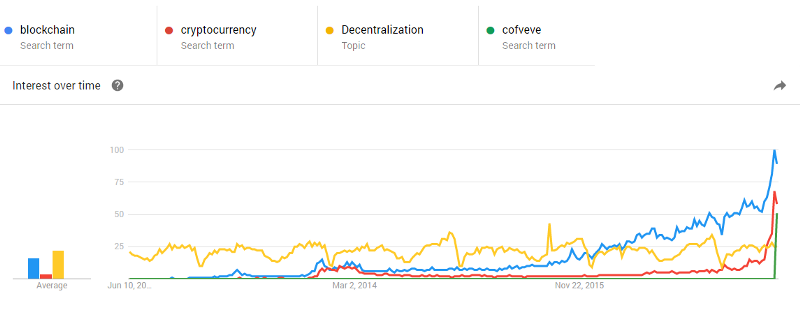Decentralized Mayhem
In this article I’d like to share some thoughts on something that seems to be everywhere on the media these days: Cryptocurrencies, Tokens, Decentralization & Blockchain. These forces are growing tremendously fast and might become the next big thing, next to Virtual Reality, Artificial Intelligence etc (or maybe even bigger). More in particular, I wanted to write a brief article on the positive and negative aspects of these trends, and overall, whether this new ecosystem makes sense or not (or which aspects of it should at least stay!).

What’s so interesting about these trends?
1.- More efficient way of ruling the world. We’re living in a world dominated by a significant amount of incompetent leaders and institutions, which keep on proving themselves wrong on almost each decision they take. Although they’ve not done it completely wrong, there certainly is a more efficient way of ruling the world. Decentralization makes it harder for incompetents or abusers to dominate the world the way they’ve been doing till now. With decentralization we remove the power from the few and give it to the people. In the current system, we for instance let less competent people have the same voting power as those who are more able. This is right, but it leaves us in mercy of people like Donald Trump, which isn’t “too efficient”. With decentralization, this is not an issue, as there’s no need for someone to rule us all. Thanks to blockchain and smart contracts, we’re able to remove many bureocratic layers and institutions. Decentralized currencies also provide a more efficient way of transacting, without the need of central banks. It’s significantly more efficient. We rule ourselves.
2.- Give privacy back to the people. Take decentralization from the perspective of privacy. It gives people the right to keep their data to themselves, as the data is encrypted, split into pieces & distributed in various machines. Corporations aren’t able to do business with your data. Additionally, it provides a more secure way of storing files. These are much harder to hack since they are decentralized.
3.- Faster way of rising funds. Thanks to tokens and the big awareness of these new trends, it’s now very simple for startups involved in these to rise funds. Startups can just issue their own token or cryptocurrency and get money in exchange for it. Startups use that money to develop their product, and once it’s ready, people can exchange these tokens for the product or service. It’s a more simple way of rising funds. As these trends are new, most of these practices aren’t regulated yet. However, who needs regulation afterall? ;)
The other side of the coin
1.- Can we really make it without Governments? We still need regulation to avoid scams and give the World some order. We also need proper tax systems to help those fellow citizens who need it and to maintain cities in good state. So yes, decentralization is good, but where’s the limit? What should and shouldn’t be decentralized? There probably are many tasks that can be performed better by decentralizing them (decentralized currencies, smart contracts etc). However, we should bear in mind that not everything can be decentralized. Bringing it to the very basics, if everyone took care of him or herself, no one would take care of those who need someone to help them out. We need to find a balance, and we need to understand that decentralization can be more efficient, but it also needs some legal boundaries to be optimally applied.
2.- Give privacy back to people. But how much is enough? Again, having more privacy sounds cool. But shouldn’t we control those who use privacy for the bad? To be more specific, what would be of the World if there would be no control whatsoever over terrorists? Again, we need to find a balance here. Decentralization can help us increase the security of our files, but it shoudn’t bilnd them completely. Blockchain transactions are trazable, and organizations that provide decentralized services should stick to strict regulations on gathering the necessary user data before providing a service. If we left room for a completely anonymous internet and transactions, the World could become a complete chaos.
3.- Finally, are ICOs (Initial Coin Offerings) sustainable in the long run? How ICOs usually work, as I explained, is by issuing a currency or token that can afterwards be traded by a product or service that a company provides. So let’s say I want to provide a decentralized way of storing files. I can create my own currency, build a product and then people will only be able to buy my product with my currency. The thing is that this could become highly impractical, due to the amount of different currencies and consequently exchange rates that we’d have. Imagine needing a different currency for every different company you’d buy something from. Doesn’t sound very attractive. ICOs can be very useful for projects as a way to rise funds, and for investors to make money for a few years. However, where I think everything will end up going is into a few global (crypto)currencies, and not a different currency from each brand we use. Another drawback of ICOs is that they are giving birth to a significant amount of scam or nonsense projects whose only purpose is to raise money, instead of building something truly useful.
We should stop and think which aspects of these new trends make sense, and in how much depth they should be accepted.
Based on these principles, I started Internxt, a project that will cooperate in the decentralization of the internet in a well-thought way that makes sense. Check it out to stay up to date with its latest trends :)